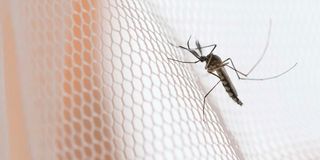WHO lauds Kenya in global fight against malaria

A mosquito on a bed net. The World Health Organization has lauded Kenya's efforts to fight malaria.
Ahead of World Malaria Day to be celebrated on April 25, the World Health Organization (WHO) has lauded Kenya's efforts to fight the killer disease.
This year’s World Malaria Day theme is “Time to deliver zero malaria: invest, innovate, implement.”
WHO Representative to Kenya Dr Diallo Abdourahmane lauded Kenya's efforts to reduce the malaria burden.
“WHO congratulates Kenya for reducing malaria burden from eight per cent in 2015 to six per cent in 2020 which translates to 25 per cent reduction,” said Dr Abdourahmane.
Other notable milestones by Kenya include the formation of the ‘Zero Malaria Campaign Coalition and the mobilisation of joint partnerships to reposition malaria advocacy and communication for malaria elimination and the establishment of the ‘End Malaria Council and Fund to mobilize resources for malaria elimination in Kenya.
The mass distribution of 16 million Mosquito nets, during the Covid-19 pandemic, was also cited by WHO as a major milestone and indoor residual spraying of houses to kill mosquitoes.
The uptake of the first WHO-recommended RTS, S malaria vaccine and its roll-out in the high to moderate malaria-endemic regions in western Kenya was also mentioned as a country’s big stride.
At the end of February 2023, over 1.1 million doses of the vaccine had been administered to children under the age of five, of whom 386,000 had received the first of the four-dose vaccine.
According to WHO the target is to reach over 134,093 children annually in eight counties around Lake Victoria, in Nyanza and western Kenya, where malaria is endemic.
At the beginning of March 2023, Kenya distributed the vaccine to another 25 sub-counties in addition to the initial 26, reaching at least 133,185 more children.
The development of the malaria Rapid diagnostic test (mRDT) kit by the Kenya Medical Research Institute, (KEMRI) also put Kenya ahead of the pack in the fight against malaria.
Dr Abdourahmane observed that Africa bears the brunt of the impact of the malaria disease on children and pregnant women, causing morbidity and mortality among those affected, according to WHO’s World Malaria Report, 2022.
There were about 247 million malaria cases in the world, with 234 million of these being recorded in Africa, which translates to 95 per cent of the cases;
There were 619,000 global malaria deaths and 593,000 of these deaths were in Africa meaning 95 per cent of malaria deaths were in the continent.
Out of 40 million pregnancies, 13.3 million, representing 32 per cent were exposed to malaria infection during pregnancy which increases the risk of low birth weight.
East and Southern Africa had the highest prevalence of exposure to malaria during pregnancy at 41per cent.
Dr Abdourahmane said the global malaria mortality rates (deaths per 100,000 population) reduced between 2000 and 2021. However, he said the rate of decline has been very slow.
“In 2020, the mortality rate increased to 15.1/100,000, before decreasing slightly to 14.8/100,000 in 2021. With current interventions, the global malaria community averted 2 billion malaria cases and 11.7 million deaths, between 2000 and 2021.”
At least 82 per cent of cases and 95 per cent of deaths were averted in the WHO African Region.
Dr Abdourahmane said there are new challenges that are threatening to blunt the fight against malaria globally like the emergence of an invasive malaria mosquito like the anopheles stephensii vector, which was discovered in Marsabit, Moyale and Turkana region.
“This mosquito transmits malaria with very high competence and it thrives in urban habitats and increases the risk to urban populations.”
Other challenges include the reduction in malaria funding.
This year the Global Fund allocation to malaria has been reduced by 10 per cent compared to the last allocation cycle.
The threats of resistance of malaria parasites to medicines and malaria diagnostics, and of mosquito vectors to insecticides also pose a major challenge among others.
WHO wants governments to increase investments in domestic financing for malaria interventions and human resources, strategic multi-sectoral collaborations to include research and academic institutions, a strong community engagement and participation in the malaria response.
Other interventions WHO wants to be undertaken include support for innovations for new tools in the fight against malaria, and expansion of implementation to increase optimal coverage of evidence-based intervention, within the WHO’s published new guidance, strategies and frameworks.
The implementation should incorporate human rights and gender, equity and inclusion of vulnerable populations.
Dr Abdourahmane said WHO is aware of the new innovation - the new R21 malaria vaccine as a potential vaccine of public health importance and was awaiting the expert review processes before a WHO recommendation can be made.




